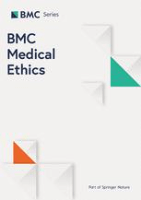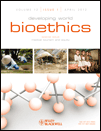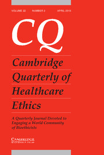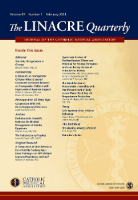
BMC Medical Ethics
Scope & Guideline
Navigating the complexities of healthcare ethics.
Introduction
Aims and Scopes
- Healthcare Ethics and Patient Rights:
The journal emphasizes the ethical principles that govern patient rights, informed consent, and shared decision-making, exploring how these principles are applied in clinical practice. - Ethics in Medical Research:
BMC Medical Ethics covers ethical issues related to biomedical research, including consent processes, the role of ethics review boards, and the implications of emerging technologies in research. - Cultural and Contextual Ethics:
The journal examines how cultural, social, and contextual factors influence ethical decision-making in healthcare, particularly in diverse populations and global health settings. - Emerging Ethical Issues in Technology:
BMC Medical Ethics addresses the ethical implications of new technologies in healthcare, including artificial intelligence, telemedicine, and digital health, focusing on their impact on patient care and privacy. - End-of-Life Care and Decision-Making:
The journal explores ethical challenges surrounding end-of-life decisions, including euthanasia, palliative care, and advance directives, reflecting on the moral complexities involved. - Interdisciplinary Approaches to Bioethics:
The journal encourages interdisciplinary research that integrates perspectives from philosophy, law, sociology, and medicine to address multifaceted ethical dilemmas in healthcare.
Trending and Emerging
- Artificial Intelligence and Ethics:
There is a growing focus on the ethical implications of artificial intelligence in healthcare, including its impact on decision-making, patient privacy, and the role of AI in clinical practice. - Mental Health and Ethical Considerations:
Recent publications have increasingly addressed the ethical dimensions of mental health care, particularly in relation to decision-making capacity and the involvement of patients in their care. - Global Health Ethics:
Emerging themes in global health ethics are gaining traction, particularly concerning equitable access to healthcare resources and the ethical implications of research in low- and middle-income countries. - Digital Health and Privacy Issues:
With the rise of telemedicine and digital health technologies, there is a notable increase in discussions regarding the ethical challenges of data privacy, consent, and the implications of remote care. - Crisis Ethics and Pandemic Responses:
The COVID-19 pandemic has catalyzed a surge in research exploring ethical dilemmas arising from crisis situations, such as resource allocation, vaccination ethics, and the responsibilities of healthcare professionals.
Declining or Waning
- Traditional Medical Ethics:
There has been a noticeable decrease in publications focused solely on classical medical ethics frameworks, such as the four principles (autonomy, beneficence, non-maleficence, and justice), as discussions increasingly incorporate broader and more complex ethical considerations. - Generalized Discussions of Consent:
The journal has seen fewer articles that address informed consent in a general sense, with a shift towards more specific contexts, such as digital consent or consent in vulnerable populations, indicating a move towards more nuanced discussions. - Ethical Issues in Specific Medical Procedures:
Topics focused on ethical dilemmas related to specific medical procedures, such as surgical ethics or specific treatment protocols, appear to be declining, possibly as more generalized ethical frameworks become the focus. - Philosophical Debates in Bioethics:
Discussions centered around philosophical debates without direct application to practical healthcare scenarios are less frequent, as the journal increasingly emphasizes empirical research and practical implications. - Historical Perspectives on Medical Ethics:
The historical analysis of medical ethics has waned, with fewer articles reflecting on past ethical dilemmas, suggesting a current focus on contemporary issues and future challenges.
Similar Journals

BioLaw Journal-Rivista di Biodiritto
Pioneering Research at the Nexus of Law and ScienceBioLaw Journal-Rivista di Biodiritto, published by UNIV TRENTO, FAC LAW, stands as a vital interdisciplinary platform in the domains of biolaw, biotechnology, and health policy. With an ISSN of 2284-4503 and a burgeoning reputation, this journal encourages critical discussions surrounding the ethical, legal, and social implications of biotechnological advancements from 2014 to 2024. Ranked Q3 in both Biochemistry and Biotechnology, alongside Q2 rankings in Law and Philosophy, it reflects a growing body of scholarship in these experimental fields. Although currently categorized with varying percentile ranks in the Scopus database, it underlines the journal's commitment to nurturing innovative research and interdisciplinary dialogue. The journal promotes open access principles, although the specific access options should be verified for each article. It serves as an indispensable resource for researchers, professionals, and students engaged in the evolving intersection of law and biotechnology, making it a key player in shaping future discourses in bioethics and policy.

Developing World Bioethics
Transforming health policy through ethical inquiry.Developing World Bioethics, published by WILEY, is an esteemed journal dedicated to the exploration and advancement of ethical issues in health and healthcare within developing countries. Since its inception in 2001, this journal has become a critical platform for disseminating scholarly research and discourse that address complex bioethical challenges in varied socio-economic contexts. With an impressive Q2 ranking in multiple categories, including Health Policy and Issues, Ethics and Legal Aspects, it stands out as a vital resource among its peers, boasting significant Scopus rankings that highlight its influence and contribution to the fields of health and social sciences. The journal is committed to fostering interdisciplinary dialogue and insight, making it an invaluable asset for researchers, professionals, and students keen on bioethics and health policy. While the journal operates on a subscription basis, it provides broad access to its diverse range of articles, ensuring that cutting-edge bioethical perspectives are available to stakeholders worldwide, with a focus on innovative solutions and best practices in healthcare systems globally.

Christian Bioethics
Integrating Faith and Reason in Bioethical Decision-MakingChristian Bioethics is a pivotal journal published by Oxford University Press, dedicated to the interdisciplinary exploration of bioethical issues from a Christian perspective. Since its inception in 1995, the journal has served as a crucial platform for scholars, practitioners, and students to engage with complex ethical questions at the intersection of medicine, philosophy, and religious studies. With an evolving scope that reflects contemporary debates in bioethics, the journal has achieved notable rankings, including Q2 in Religious Studies and Q3 in Philosophy in 2023, underscoring its significance in these fields. While not open access, Christian Bioethics continues to bridge gaps between faith and science, encouraging rigorous dialogue on how Christian ethics can inform bioethical decision-making and policy. It is essential reading for those looking to deepen their understanding of ethical issues shaped by religious convictions, making it an invaluable resource for researchers and professionals alike.

International Journal of Chinese & Comparative Philosophy of Medicine
Illuminating the Pathways of Health through Comparative AnalysisThe International Journal of Chinese & Comparative Philosophy of Medicine, published by GLOBAL SCHOLARLY PUBLICATIONS, is a pivotal scholarly platform dedicated to advancing the discourse around traditional Chinese medicine and comparative philosophies in healthcare. With the ISSN 1386-6354, this journal provides a rich repository of peer-reviewed articles that explore integrative approaches to medicine, addressing both historical context and contemporary applications. Although specific metrics such as impact factor are currently unavailable, it aspires to foster interdisciplinary dialogue among researchers, professionals, and students by encouraging innovative thinking and comparative analysis within the realm of medical philosophy. While currently operating under non-open access guidelines, the journal remains committed to disseminating knowledge that bridges diverse medical practices, making it an invaluable resource for those engaged in the study and application of philosophical medicine.

New Bioethics-A Multidisciplinary Journal of Biotechnology and the Body
Illuminating the Social Implications of Biotechnological AdvancesNew Bioethics: A Multidisciplinary Journal of Biotechnology and the Body, published by Taylor & Francis Ltd, serves as a pivotal platform for scholarly discourse at the intersection of biotechnology, health policy, and bioethics. With an ISSN of 2050-2877 and E-ISSN 2050-2885, this journal has been contributing to the academic community since its establishment in 2012 and is set to continue through 2024. It holds notable rankings in prestigious fields, including Q4 in Genetics (clinical), Q3 in Health Policy, Q2 in Issues, Ethics and Legal Aspects, and Q3 in Reproductive Medicine as per 2023 quartile indicators. Although no open access model is available, the journal remains an essential resource for those interested in the ethical implications of biotechnological advancements. Its focus on the ethical, legal, and social dimensions of biotechnology is particularly relevant in today's rapidly evolving scientific landscape, making it invaluable for researchers, professionals, and students keen to explore the complexities surrounding the biotechnology and the human condition.

HEALTH CARE ANALYSIS
Pioneering research for a healthier future.HEALTH CARE ANALYSIS, published by SPRINGER, is a distinguished journal that has been contributing to the field of Health Policy and related disciplines since its inception in 1993. With a significant focus on the intricate issues, ethics, and legal aspects surrounding healthcare, this journal holds a prominent status reflected in its Q2 rankings across various categories, including Health Policy, Health (social science), and Issues, Ethics and Legal Aspects. As of 2023, it ranks in the top quartiles of its respective fields, indicating robust scholarly engagement and impact within the academic community. Although the journal is not open access, it remains accessible to a wide audience through institutional subscriptions, making it an essential resource for researchers, healthcare professionals, and policy-makers seeking to advance their understanding of complex healthcare systems and ethical considerations. Positioned in the Netherlands, HEALTH CARE ANALYSIS continues to drive critical dialogue and research, ensuring its relevance in shaping future healthcare policies and practices.

KENNEDY INSTITUTE OF ETHICS JOURNAL
Exploring Ethical Frontiers in Health Policy and PhilosophyThe KENNEDY INSTITUTE OF ETHICS JOURNAL, published by the prestigious Johns Hopkins University Press, stands as a leading periodical in the realm of ethics, particularly emphasizing the intersection of health policy, social sciences, history, and philosophy of science. With an ISSN of 1054-6863 and an E-ISSN of 1086-3249, this journal has been a cornerstone of ethical discourse since its inception in 1991. Renowned for its rigorous peer-review process, the journal boasts impressive rankings, including Q1 in History and Philosophy of Science and Q2 in Health (Social Science) for 2023. Researchers, professionals, and students alike will find this journal invaluable for navigating complex ethical issues, providing a platform for innovative research and discourse. Although currently not offering Open Access, its contributions to the fields of ethics and legal aspects of health are profound, making it an essential resource for those engaged in these critical discussions.

CAMBRIDGE QUARTERLY OF HEALTHCARE ETHICS
Exploring the Intersection of Ethics and Health Policy.CAMBRIDGE QUARTERLY OF HEALTHCARE ETHICS is a premier journal published by Cambridge University Press, focusing on significant issues at the intersection of healthcare, ethics, and policy. With an ISSN of 0963-1801 and an E-ISSN of 1469-2147, this journal serves as a vital platform for discourse among researchers, practitioners, and scholars in the health social sciences. Emphasizing vital ethical considerations in healthcare practices and policies, it ranks in the Q3 tier for Health Policy and Q2 for both Health (Social Science) and Issues, Ethics, and Legal Aspects according to the 2023 journal category quartiles. The journal, spanning its tenure from 1992 to 2024, features rigorous peer-reviewed articles that contribute to the advancement of ethical standards in healthcare. By addressing contemporary ethical dilemmas and promoting scholarly dialogue, CAMBRIDGE QUARTERLY OF HEALTHCARE ETHICS remains an essential resource for those committed to understanding the complexities and ethical implications inherent in health systems today.

BIOETHICS
Bridging Philosophy and Practice in Contemporary Bioethical Issues.BIOETHICS is a leading academic journal published by Wiley, dedicated to exploring the multifaceted issues at the intersection of healthcare, philosophy, and policy. With an ISSN of 0269-9702 and an E-ISSN of 1467-8519, it has established itself as a critical platform for scholarly discourse since its inception in 1987. The journal holds impressive rankings, featuring in the Q1 category in both Health (social science) and Philosophy, alongside a Q2 rating in Health Policy for 2023. This positions BIOETHICS in the top echelons of its fields, ranking 35th out of 806 in Philosophy and garnering high percentiles across relevant disciplines. By fostering a deeper understanding of ethical implications in medical and social contexts, BIOETHICS serves as an essential resource for researchers, professionals, and students committed to addressing contemporary challenges in health and policy. The journal is accessible through institutional subscriptions and offers an engaging platform for the dissemination of significant research findings and theoretical advancements, paving the way for future exploration in bioethical inquiry.

Linacre Quarterly
Exploring Ethical Dimensions in Health PolicyLinacre Quarterly, published by SAGE Publications Inc, is a distinguished journal that serves as an interdisciplinary platform in the fields of Health Policy and Philosophy. With an ISSN of 0024-3639 and an E-ISSN of 2050-8549, this journal has been pivotal in providing insights into the intricate dynamics of health policy through a philosophical lens since its inception in 1945. Notably, it holds a respectable 2023 Scopus rank, placing it in the 68th percentile within the Arts and Humanities (Philosophy) category and the 21st percentile in Medicine (Health Policy). Though currently not offering Open Access options, Linacre Quarterly remains committed to advancing scholarly discussion and fostering innovation among researchers, professionals, and students alike. Located in the United Kingdom, this journal continues to uphold its reputation as a vital resource for those navigating the complexities of health-related ethical dilemmas and policy-making frameworks, thereby enhancing its visibility and relevance in academic discourse.